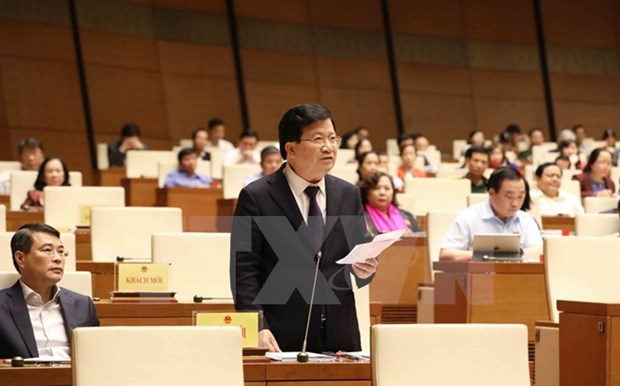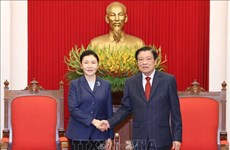Legislators conclude discussions on socio-economic matters
Lawmakers concluded their discussions on socio-economic development and state budget and allocation on Nov 2 after two and a half days, as part of the fourth sitting of the 14th National Assembly.
 Deputy Prime Minister Trinh Dinh Dung speaks at the working session (Source: VNA)
Deputy Prime Minister Trinh Dinh Dung speaks at the working session (Source: VNA)Hanoi (VNA) – Lawmakers concluded their
discussions on socio-economic development and state budget and allocation on
November 2 morning after two and a half days, as part of the fourth sitting of
the 14th National Assembly.
After pointing to shortcomings in such areas as growth quality, health care, education, poverty reduction, transport, and budget collection and spending in the past first months of 2017, the deputies worked on measures and tasks for the remaining months of the year and 2018.
They asked the Government to better ensure social welfare, combat diseases, and maintain social order and safety, as well as national defence and security.
Efforts should be focused on stabilising the macro-economy, improving the business environment, streamlining administrative procedures, restructuring the economy in a comprehensive and sustainable manner, and accessing achievements generated by the fourth industrial revolution to serve national socio-economic development, they said.
Other tasks include managing natural resources, protecting the environment, developing organic agriculture, responding to climate change, providing vocational training for farmers, especially those in localities affected by drought, flooding, climate change and saltwater intrusion, and increasing inspections of food safety and hygiene.
The legislators held that in terms of culture, education, health care and population, more attention should be paid to remote and ethnic minority-inhabited areas.
They also underlined the need to push the fight against corruption and wastefulness, improve the managerial efficiency of the Government and all-level authorities, increase coordination between agencies, and intensify decentralisation for localities.
Lawmakers suggested restructuring budget spending, which, they said, should be focused on health care, education, social welfare, environmental protection and forestation.
Budget allocation should target key economic regions, they said, adding that more heed should be paid to the Northwestern, Central Highlands and Southwestern regions which have faced a range of difficulties.
The deputies also urged the Government to devise measures in order to increase collections, cut overspendings and manage public, Government and foreign debts.
At the working session, Deputy Prime Minister Trinh Dinh Dung and concerned ministers cleared up concerns raised by the deputies.
On the basis of the outcomes of the discussions, agencies of the NA and Government will complete draft resolutions on the socio-economic development plan, and state budget estimate and allocation in 2018 to be submitted to the legislature for approval.
In the afternoon, the lawmakers mulled over the delay of the implementation of the new curriculum and textbook programme.
They agreed that the programme will be carried out at primary level from the 2019-2020 academic year, secondary schools from the 2020-2021 school year and high schools from the 2021-2022 school year.
On November 3 morning, the legislators are scheduled to debate the draft law amending and supplementing a number of articles of the Law on Overseas Representative Missions of the Socialist Republic of Vietnam, and the construction of a number of sections of the North-South Expressway during 2017-2020.
In the afternoon, they will look into contentious contents of the amended Law on Public Debt Management.-VNA
After pointing to shortcomings in such areas as growth quality, health care, education, poverty reduction, transport, and budget collection and spending in the past first months of 2017, the deputies worked on measures and tasks for the remaining months of the year and 2018.
They asked the Government to better ensure social welfare, combat diseases, and maintain social order and safety, as well as national defence and security.
Efforts should be focused on stabilising the macro-economy, improving the business environment, streamlining administrative procedures, restructuring the economy in a comprehensive and sustainable manner, and accessing achievements generated by the fourth industrial revolution to serve national socio-economic development, they said.
Other tasks include managing natural resources, protecting the environment, developing organic agriculture, responding to climate change, providing vocational training for farmers, especially those in localities affected by drought, flooding, climate change and saltwater intrusion, and increasing inspections of food safety and hygiene.
The legislators held that in terms of culture, education, health care and population, more attention should be paid to remote and ethnic minority-inhabited areas.
They also underlined the need to push the fight against corruption and wastefulness, improve the managerial efficiency of the Government and all-level authorities, increase coordination between agencies, and intensify decentralisation for localities.
Lawmakers suggested restructuring budget spending, which, they said, should be focused on health care, education, social welfare, environmental protection and forestation.
Budget allocation should target key economic regions, they said, adding that more heed should be paid to the Northwestern, Central Highlands and Southwestern regions which have faced a range of difficulties.
The deputies also urged the Government to devise measures in order to increase collections, cut overspendings and manage public, Government and foreign debts.
At the working session, Deputy Prime Minister Trinh Dinh Dung and concerned ministers cleared up concerns raised by the deputies.
On the basis of the outcomes of the discussions, agencies of the NA and Government will complete draft resolutions on the socio-economic development plan, and state budget estimate and allocation in 2018 to be submitted to the legislature for approval.
In the afternoon, the lawmakers mulled over the delay of the implementation of the new curriculum and textbook programme.
They agreed that the programme will be carried out at primary level from the 2019-2020 academic year, secondary schools from the 2020-2021 school year and high schools from the 2021-2022 school year.
On November 3 morning, the legislators are scheduled to debate the draft law amending and supplementing a number of articles of the Law on Overseas Representative Missions of the Socialist Republic of Vietnam, and the construction of a number of sections of the North-South Expressway during 2017-2020.
In the afternoon, they will look into contentious contents of the amended Law on Public Debt Management.-VNA













